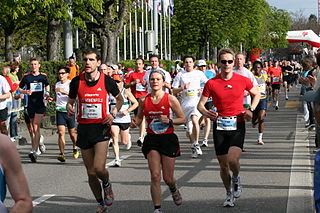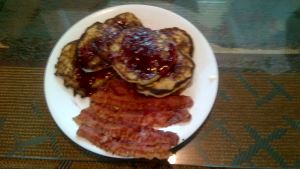Best Food Choices for Runners
Eating for Runners
 Advice for runners nutrition printed in popular literature tends to emphasize protocols of what to eat before, during and after an event.
Advice for runners nutrition printed in popular literature tends to emphasize protocols of what to eat before, during and after an event.
Such protocols are very important and usually based on some very good science but they should not overshadow the basic fundamentals of sound nutritional practices.
Optimum health should be the first line of thought for any runner. Think about this – a runner can get enough calories for a 2 –4 hour run by eating enough sugar and drinking enough water.
However such a narrow protocol does not address immune function, protein needs for muscle repair and the need for nutrients to allow the body to recover and function well.
All eating plans must be
- Protein adequate
- Essential Fatty acid adequate
- Fibre adequate
- Anti-oxidant adequate
- Nutrient adequate
When you consider that major supermarkets stock around 30,000 items and that most people have 21 favourite meals it can be difficult to consistently make the best choices. This is particularly true if you watch television and constantly see what the advertisers are trying to convince you to include in your grocery cart.
Runners Diet
Although there are no single magic “super-nutritious” foods, there are several that have qualities that help you meet the above listed criteria for an optimal eating plan.
Here are my favourites to include in your grocery cart and hopefully they are easy choices that will work with your favourite menus.
Protein
* most runners do not eat enough
Eggs
Eggs are a great source of complete protein and just one egg will give you 30% of the recommended Vitamin K intake (vital for healthy bones). They are also a source of choline (good for memory), leutin (good for the eyes) and if you choose omega eggs you add even more benefits.
Do not worry about the cholesterol in eggs. Dr. Ancel Keys (cholesterol expert at the University of Minnesota) stated in 1998 that there is no connection between cholesterol in food and cholesterol in blood. In fact a recent University of Washington study showed that egg eaters have less heart disease risk than non-egg eaters.
Yogurt
Yogurt is a good source of protein (1 cup = 14 – 16 gm), calcium and healthy friendly bacteria that helps to maintain digestive health. Choose plain over flavoured because flavoured is usually loaded with extra sugars. You can add a small amount of fruit (1/ 3 of a banana or ½ cup of berries to 1 cup of yoghurt) or nuts if you need extra flavour.
Salmon
Salmon is a great source of high quality protein (5 oz = 35 gm of protein) and wild salmon are a great source of omega fatty acids. Omega 3 is implicated as an anti-inflammatory nutrient and is an essential fat necessary for the metabolism of other fats.
Turkey and/or Chicken
Turkey and chicken are excellent protein sources (4 oz = 28-30 gm) and they are low in fat. They are both excellent sources of B vitamins and the antioxidant selenium.
Soy
Soy is the most complete vegetable protein and is a great source of isoflavones that are known to reduce cholesterol, reduce heart disease risk and help to maintain the balance of many hormones.
Tofu is a fermented soy product and very versatile in many recipes. (3 oz firm = 13 gm protein, ½ cup firm = 20 gm protein)
Soy Supplement: In a fast paced world this is a convenient and healthy way to ensure adequate protein intake. The protein to calorie ratio is also good but be sure to use a protein “isolate” and not a “concentrate”.
Fruit
* an excellent source of micronutrients
Berries
The compounds that give berries their rich colours are the “anthocyanins” – a group of antioxidants that protect us from free radical damage. Oxidized free radicals are more plentiful during intense exercise and the antioxidants are the great protectors from this oxidation. Berries are also low glycemic index carbohydrates with a good supply of fibre.
Citrus Fruits
Oranges and grapefruit are low glycemic fruits rich in vitamin C and the bioflavanoids – both powerful antioxidants.
Tomatoes
Are a great source of lycopene, an antioxidant more potent than vitamin C. Lycopene stimulates immune function and is implicated in prostate health.
Apricots
Fresh apricots are high in beta-carotene. Also contains vitamin C, potassium, fibre (2.5 gm in 3 apricots) and an excellent source of vitamin A.
Grains
Sprouted Wheat Breads
Are a low glycemic index source of carbohydrates that are much higher in protein (5-6 gm per slice) than convention breads. Fibre content averages 5 gm per slice and the nutrient density for B vitamins is very high.
Oats
Oat bran is known to reduce cholesterol and blood pressure due to the high level of soluble fibre. Oats are also one of the higher protein grains (5-6 gm / 1/3 cup). It is recommended that you use large flake not instant oats.
Whole Grain Cereals
Good whole grain cereals are a source of fibre, protein and B vitamins. Look for brands that contain at least 5 gm of fibre / serving and 4-6 gm of protein. These would include “Nature’s Path Optimum” and “Back to Nature Flax and fibre”. Mixed with soy protein supplement and milk or soy beverage makes a good high fibre high protein meal.
Whole Grain Pasta
Has the same benefits as whole grain cereal. Some varieties also contain additional B vitamins, and Omega 3 from flax seeds This low glycemic choice combined with 4- 6 oz of chicken or meat is a good meal choice.
Vegetables
(like fruit – an excellent delivery system for micronutrients)
Broccoli
Next to soy this is and excellent vegetable protein source. Broccoli is 40% protein, although it is not complete but when combined with cheese is and great meal item. It is a great source of Vitamins C, A Beta Carotene and soluble fibre. It contains many nutrients association with Cancer prevention and immune function.
Beans
Are another high protein, high soluble fibre and low glycemic vegetable. (A good source of protein but still primarily a carbohydrate). Known to contain phytochemicals and protease inhibitors that may prevent cancer. High in B vitamins particularly folic acid.
Spinach
Spinach is one of the high nutrient density green leafy vegetables. High in the antioxidants vitamin C and A, folic acid and magnesium. Implicated in good eye health.
Carrots
Carrots are a rich source of Beta Carotene and insoluble fibre. Because of the insoluble fibre level they release their natural sugars easily so tend to be higher on the glycemic index scale but eaten with other high fibre foods like those in a stir-fry they offer many health benefits.
Sweet Potatoes
Are a good source of Vitamin A in the form of beta carotene, vitamin C potassium, iron, manganese, and copper. These nutrient levels are challenged during endurance running. This low glycemic starch also contains anthocyanidins which are strong antioxidants against free radical damage.
Nuts & Seeds
Nuts in general are very nutritious, providing protein and many essential vitamins, such as A and E, minerals, such as phosphorous and potassium, and fibre. Nuts are also high in fats, so shouldn't be eaten in excess.
Almonds / Almond Butter
This is better than peanut butter that is a legume – not a real nut and peanuts tend to be infected with the carcinogenic aflatoxin fungus). Almonds are good source of Vitamin E – particularly the “gamma tocopherol” absent in many supplements. 100g contain 16.9g protein, 4.2mg iron, 250mg calcium, 20mg vitamin E, 3.1mg zinc and 0.92mg vitamin B2 all of which means excellent nutrient density.
Pumpkin Seeds
Are a good source of essential fatty acids and other anti-inflammatory nutrients. Also implicated in prostate health. They are rich in protein, iron, zinc and phosphorous.
Walnuts
Another good source of essential fatty acids, protein and iron. They go rancid very quickly so should be stored in the freezer.
I encourage you to incorporate the items from this list as a means to ensuring optimal nutrient density in your eating plan. Here are two of my favourite recipes that incorporate some to the above items.
Meal Plans

Power Pancakes
- Egg 1 Large
- Soy Protein supplement 3 TBSP
- Rolled Oats (Large Flake 1/3 Cup
- 2% Cottage Cheese ¼ Cup
- 1tsp oil
Mix Egg, oil and Cottage Cheese together before adding dry ingredients. Add 1 tsp Baking powder
Topping: 1 Cup Yogurt (Plain), ½ Cup Blue Berries or 1 Cup Flavoured Yogurt
Blend well. Serves one person
Blueberries Oatmeal Mookies
cross between a muffin and a cookie
- Blueberries - 2 Cups
- Oatmeal (large flake) - 3 Cups
- Soy Protein supplement -- 20 TBSP (10 servings)
- Applesauce, unsweetened - ½ Cup
- Oil - 4 TBSP
- 2% Milk - 1 Cup
- Eggs Large - 3
- Baking Powder -1tsp
- Cinnamon -1 tsp
- Salt - ½ tsp
Mix wet ingredients into dry ingredients. Bake in 9-inch square baking dish at 350 for 1 hour (approx. - watch carefully). Cut into 16 bars, or bake as 12 to 14 muffins.
References
1. Eating for Runners - by Dr. L. Lee Coyne, Published in IMPACT Magazine as "Eating for Runners".
LeanSeekers
https://leanseekers.com/Articles/Sports-Nutrition/Runners-Diet